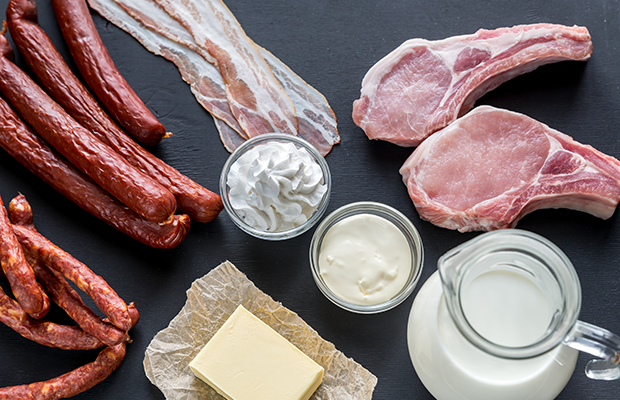
Sugar vs fat: which is worse?
Whether fat or sugar is worse for your health has become a dietary battleground. Senior Dietitian Victoria Taylor assesses the views on both sides.


Why is sugar bad for you?

Overall, the problem with too much sugar is that it tends to mean your diet will be high in calories (energy) and this can lead to putting on weight. Excess weight increases the chances of developing type 2 diabetes and heart and circulatory diseases.
Not all foods containing sugars are the same. Fruit or dairy products contain natural sugars but are nutritious foods that contain vitamins, minerals and in some cases fibre.
What we need to cut down on are free sugars, which include added sugars, syrups, or juices. They’re “free” because they’re not naturally within the food, either because they’re added, or they’re released from the cells of fruit when it’s cooked, or when it’s processed into juices, smoothies and purees. It’s recommended that we eat less than 30g (1oz) of free sugars each day, but most of us are eating more than this.
Fruit or dairy products contain natural sugars but are nutritious foods
Foods high in free sugar like sweets, biscuits, chocolate bars, jam and sugary drinks are high in energy (calories), but these are “empty calories” because they don’t offer much else nutritionally. Fruit juice, which is high in free sugars, does contain some vitamins – but you’d get more nutrients and less sugar if you ate a piece of fruit instead of having a glass of juice. Eating too many sugary foods also leaves less room in the diet for other foods which could provide more nutrients.
- Learn more about free sugars
- Get tips on reducing your sugar intake
Want to get fit and healthy?
Sign up to our fortnightly Heart Matters newsletter to receive healthy recipes, new activity ideas, and expert tips for managing your health. Joining is free and takes two minutes.
I’d like to sign upIs fat bad for you?

In the past, dietary advice has focused on eating less fat, but the emphasis is now on the type of the fat. This is because our dietary patterns have changed and our understanding of how fats relate to risk of heart and circulatory diseases has developed.
Unlike sugar, where we’re eating more than is recommended, in the UK we’re eating about the right amount of total fat on average. Fat is important to provide us with some essential fatty acids, and fat-soluble vitamins including A, D and E. But if you’re watching your weight, it’s worth bearing in mind that fat is the highest-calorie nutrient (weight for weight, it has more than twice as many calories as protein or carbohydrate) so eating too much can mean a high-calorie diet.
What most of us are still eating too much of is saturated fat – the kind from animal sources.
What most of us are still eating too much of is saturated fat – the kind from animal sources, or coconut and palm oils. Too much saturated fat is linked to raised cholesterol levels, which are a risk factor for heart and circulatory diseases. This type of fat is found in foods like butter, lard, ghee, cream, cheese, fatty meats, pastries, cake, chocolate and biscuits. Research has shown that switching saturated fat for unsaturated fat – like olive or rapeseed oil, nuts and seeds, or oily fish – can help to improve cholesterol levels.
What isn’t helpful for your heart health is replacing saturated fat with sugars or other refined carbohydrates (such as white bread, pasta or rice).
- Learn more about different types of fat
Is sugar or fat worse for weight loss?
One area of debate is whether it’s more helpful for weight loss to focus on reducing sugar and other carbohydrates, or fat.
Research suggests that either can be effective in the short term (and so can other approaches like a Mediterranean-style diet or a well balanced reduced-calorie diet), but doesn’t tell us that one approach is better than the other. So the most effective approach is the one that works best for you.
Whether you’re reducing carbs or fat, many of the foods that you’ll be cutting back on are the same. Biscuits, cakes, chocolate and ice cream are high in both fat and sugar.
The verdict
Both fat and sugar matter when it comes to a healthy diet and your risk of developing heart and circulatory diseases. Pitting the two against each other is unhelpful as they are linked, both in terms of their effects on our health and in the foods we eat.
Try to keep added sugars to a minimum, rather than cutting back on healthy sources of sugar such as whole pieces of fruit or low-fat dairy products. Similarly, avoid saturated fat such as butter, ghee and coconut oil, and choose unsaturated fats such as olive or rapeseed oil, nuts and seeds, or oily fish.
Nutrition labels can help you understand how much saturated fat or sugar is in different foods. Try to keep foods high in saturated fat or free sugars for every now and then, rather than every day. This can help your heart health and give more room in your diet for more nutritious foods.
- Learn more about food labels and how to read them
Published 28 February 2022
What to read next...
How to cut back on sugar without noticing




